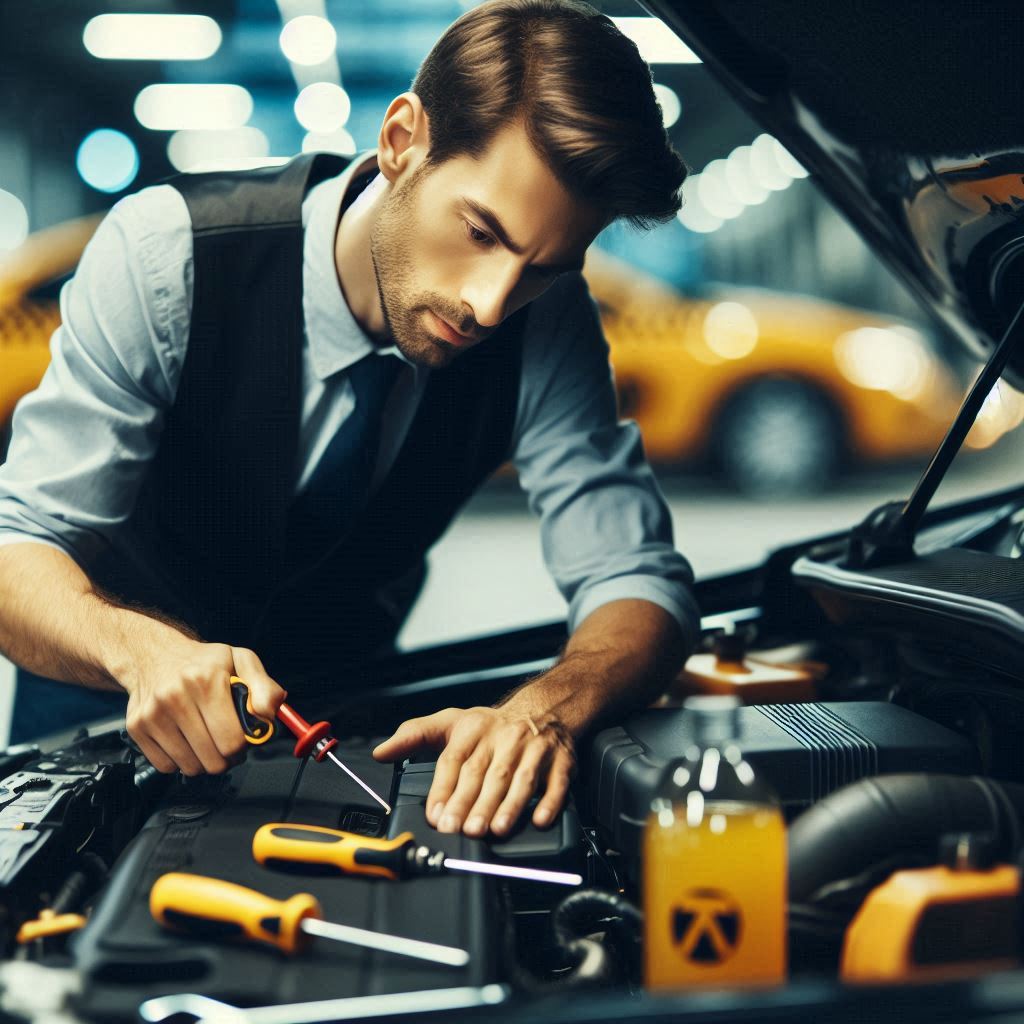Introduction
Maintaining your vehicle as a taxi or rideshare driver is essential for success and long-term savings.
Regular upkeep ensures your car stays reliable, preventing unexpected breakdowns that could disrupt your work schedule.
A well-maintained vehicle also improves fuel efficiency, reducing operational costs over time.
Proper maintenance plays a key role in keeping your passengers safe and comfortable.
A smooth ride creates a positive experience, which can lead to higher ratings and more tips.
Neglecting maintenance, however, risks accidents and costly repairs.
Here’s how maintenance benefits you:
- Saves Money: Prevents expensive repairs through early detection of issues.
- Improves Safety: Ensures brakes, tires, and lights function correctly.
- Boosts Comfort: Keeps air conditioning and interior clean for passenger satisfaction.
Key areas to focus on include:
- Routine Checks: Monitor oil levels, tire pressure, and brake condition weekly.
- Scheduled Servicing: Follow the manufacturer’s service intervals to maintain engine performance.
- Cleanliness: Vacuum seats and sanitize surfaces to ensure a pleasant environment.
By maintaining your vehicle properly, you maximize earnings, avoid downtime, and provide safe, high-quality rides.
Regularly Scheduled Maintenance
Follow the Manufacturer’s Recommended Maintenance Schedule
As a taxi or rideshare driver, your vehicle endures more wear and tear than usual.
To keep it running efficiently, follow the manufacturer’s recommended maintenance schedule.
This schedule provides guidance on when to service critical components, such as the engine, brakes, and transmission.
Sticking to the schedule ensures your vehicle stays in optimal condition.
Ignoring these recommendations may lead to costly repairs and unnecessary downtime.
Routine maintenance also preserves your vehicle’s warranty, saving you money if something fails prematurely.
The Benefits of Preventative Maintenance
Preventative maintenance prevents small issues from becoming major problems.
By addressing minor wear and tear early, you avoid expensive breakdowns that disrupt your driving.
For instance, regularly changing your oil improves engine performance and extends its lifespan.
Checking and replacing brake pads when needed ensures your safety and prevents damage to the rotors.
Staying proactive about vehicle care boosts fuel efficiency, allowing you to make more money while spending less on fuel.
Preventative maintenance also ensures that your vehicle passes inspections, keeping it roadworthy for your rideshare job.
Maintaining your vehicle can also enhance the passenger experience.
A well-maintained car runs smoothly, without strange noises or uncomfortable vibrations.
Passengers appreciate a reliable, comfortable ride, leading to higher ratings and more tips.
Preventative maintenance reduces the likelihood of on-road issues, like breakdowns or flat tires, which could hurt your reputation as a driver.
By maintaining your vehicle, you also contribute to safety on the road, reducing the risk of accidents or other hazards.
Tips for Keeping Track of Maintenance Records
Keeping accurate maintenance records is crucial for every taxi or rideshare driver.
These records help you stay on top of scheduled maintenance and track what has been done.
First, start by using a maintenance log or app to record each service, including the date and type of maintenance.
Many apps can remind you when it’s time for your next service based on your mileage.
Store all receipts and invoices from repairs and maintenance services in a dedicated folder, either physical or digital.
This way, you’ll have proof of completed work, which is helpful if any warranty issues arise.
Consistent records also increase the resale value of your car, proving it’s been properly cared for.
If you decide to sell your vehicle or return it to a leasing company, well-documented maintenance history shows you took good care of it.
If you use multiple shops, always ask them to update your records and keep everything organized.
Regularly reviewing your records helps you spot patterns and anticipate future service needs, preventing costly surprises.
Checking Fluid Levels
As a taxi or rideshare driver, maintaining your vehicle’s performance is crucial.
Regularly checking and topping off fluid levels can prevent costly repairs and enhance safety.
Fluids play an essential role in your vehicle’s operation.
They lubricate moving parts, help cool the engine, and ensure smooth braking.
By monitoring fluid levels, you can keep your car running smoothly and efficiently.
Importance of Checking and Topping Off Fluids Regularly
Neglecting fluid levels can lead to severe problems.
Low oil levels can cause engine damage, while inadequate coolant can result in overheating.
Insufficient brake fluid compromises your braking system, putting you and your passengers at risk.
Regularly checking fluid levels allows you to identify issues early, saving you time and money.
Many rideshare drivers overlook the importance of fluids.
They often focus on fuel, but fluids are just as vital.
Make it a habit to check fluids every week.
This simple practice can significantly enhance your vehicle’s lifespan and performance.
Different Fluids and Their Importance
Several key fluids keep your vehicle functioning correctly.
Engine oil lubricates the engine, reducing friction and wear.
It also helps cool engine components.
Regularly changing oil ensures optimal performance and longevity.
Coolant regulates engine temperature and prevents overheating.
A healthy coolant level keeps the engine running efficiently, especially during extreme temperatures.
Inspect the coolant reservoir regularly to maintain proper levels.
Brake fluid transfers force from the brake pedal to the brake components.
Low brake fluid can lead to brake failure.
Always check your brake fluid level and replace it if necessary.
Transmission fluid lubricates and cools the transmission, ensuring smooth gear shifts.
Low transmission fluid can cause erratic shifting and potential transmission failure.
Regular checks will help maintain smooth operation.
Power steering fluid ensures easy steering.
Low levels can lead to difficulty steering and increased strain on the steering system.
Always top off the fluid if necessary.
Tips for Checking Fluid Levels and When to Top Them Off
To check fluid levels, locate the corresponding reservoir under the hood.
Most reservoirs have markings indicating minimum and maximum levels.
Always check fluids when the engine is cool to avoid burns.
Start by checking engine oil using the dipstick.
Remove the dipstick, wipe it clean, reinsert it, and check the level.
If low, add oil gradually, and check again.
For coolant, inspect the reservoir and ensure it’s between the marked lines.
If low, add a 50/50 mix of coolant and water.
Brake fluid should be at the “full” line on the reservoir.
If it’s low, add the manufacturer-recommended fluid.
Check transmission fluid with the engine running.
Pull out the dipstick, wipe it clean, and insert it again.
Add fluid as needed.
Consistently checking and topping off fluid levels is essential for any taxi or rideshare driver.
It helps prevent breakdowns and enhances safety on the road.
Make it part of your regular vehicle maintenance routine.
Read: Understanding Pet Grooming Safety Standards
Tire Care
As a taxi or rideshare driver, you rely on your vehicle for your livelihood.
Proper tire care plays a crucial role in ensuring passenger safety and vehicle performance.
In this section, we’ll explore the importance of maintaining tire pressure, discuss tire rotation and wear checks, and provide tips for keeping your tires in excellent condition.
Importance of Maintaining Proper Tire Pressure
Maintaining the correct tire pressure is vital for safe driving.
Under-inflated tires can lead to poor handling and longer stopping distances.
They also increase the risk of tire blowouts, which can endanger you and your passengers.
Over-inflated tires may cause uneven wear and reduce traction on the road.
To keep your tires properly inflated, check the pressure regularly.
Use a reliable tire pressure gauge to measure each tire’s pressure.
Refer to your vehicle’s owner manual or the sticker on the driver’s door for the recommended pressure.
Aim to check tire pressure at least once a month and before long trips.
Keep in mind that temperature affects tire pressure.
Cold weather can cause the pressure to drop, while heat can cause it to rise.
Adjust the pressure accordingly to maintain optimal performance.
A well-inflated tire improves fuel efficiency, saving you money in the long run.
Rotating Tires and Checking for Wear
Rotating your tires is essential for even wear and longevity.
Tires wear differently depending on their position on the vehicle.
Regular rotation helps ensure all tires wear at the same rate, extending their lifespan.
Follow the manufacturer’s recommendations for tire rotation intervals.
You should rotate your tires every 5,000 to 7,500 miles.
This practice helps you get the most value from your tire investment.
While rotating your tires, inspect them for signs of wear.
Check for uneven tread wear, cracks, or bulges.
Use the penny test to assess tread depth: insert a penny into the tread with Lincoln’s head facing down.
If you can see all of Lincoln’s head, it’s time to replace the tire.
Transform Your Career Today
Unlock a personalized career strategy that drives real results. Get tailored advice and a roadmap designed just for you.
Start NowTips for Keeping Tires in Good Condition for Passenger Safety
You can take several proactive measures to keep your tires in good condition.
Start by maintaining a regular tire maintenance schedule.
This includes checking tire pressure, rotating tires, and inspecting for wear.
Avoid overloading your vehicle, as excessive weight can stress your tires.
Maintain an even distribution of weight inside your vehicle to reduce strain on individual tires.
Keep your tires clean and free from debris.
Regularly wash your tires to remove dirt and brake dust.
This practice helps maintain their appearance and performance.
Always drive responsibly.
Avoid sudden stops and sharp turns, which can cause excessive tire wear.
Safe driving habits not only enhance passenger safety but also prolong your tires’ lifespan.
By prioritizing tire care, you ensure a safer and smoother ride for yourself and your passengers.
Proper maintenance can save you time and money while enhancing the overall driving experience.
Read: How to Deal with Pet Grooming Allergies
Regular Cleaning
Keeping your vehicle clean is essential for taxi and rideshare drivers.
A clean car creates a welcoming atmosphere for passengers.
It also reflects your professionalism and commitment to quality service.
Neglecting cleanliness can lead to negative experiences and lower ratings.
Make regular cleaning a priority in your routine.
Importance of Keeping the Interior and Exterior Clean
A tidy interior significantly impacts passenger comfort.
Stains, crumbs, and odors can make passengers uncomfortable.
A clean environment encourages them to ride with you again.
The exterior of your vehicle also matters.
A shiny, well-maintained exterior enhances your car’s appearance and draws more customers.
Additionally, regular cleaning helps protect your vehicle’s surfaces.
Dirt and grime can lead to long-term damage, reducing your car’s value.
A clean vehicle maintains a professional image, attracting higher-paying customers.
You build trust when passengers see you care about your vehicle’s cleanliness.
This attention to detail fosters a sense of safety and reliability.
Tips for Quick Daily Cleaning Routines
You can maintain cleanliness with a few simple daily routines.
Start by keeping cleaning supplies handy in your vehicle.
Stock up on microfiber cloths, disinfectant wipes, and a small trash bag.
After each ride, quickly wipe down surfaces where passengers sat.
This simple action helps keep the interior fresh.
Encourage passengers to use the trash bag.
Remind them to dispose of any waste before exiting.
At the end of each shift, vacuum your vehicle’s floors and seats.
This routine prevents dirt and debris from building up over time.
Consider using a lint roller to remove pet hair or debris from seats.
This quick tip can make a big difference.
To maintain your vehicle’s exterior, wash it regularly.
Frequent washes help prevent dirt buildup and protect the paint.
Deep Cleaning and Detailing Services
While daily cleaning routines keep your vehicle presentable, deep cleaning is vital too.
Schedule deep cleaning every few months to maintain your vehicle’s condition.
Professional detailing services thoroughly clean and rejuvenate your car’s interior and exterior.
They reach areas that regular cleaning might miss.
Detailing services can remove stubborn stains and odors, leaving your vehicle looking brand new.
They also provide waxing and polishing, which enhance your car’s shine and protect its paint.
Investing in detailing services can significantly improve your vehicle’s longevity.
Regular cleaning is crucial for taxi and rideshare drivers.
By prioritizing both quick cleaning routines and deep cleaning services, you ensure a welcoming experience for passengers.
A clean vehicle boosts your professional image and increases your potential earnings.
Take pride in your vehicle’s cleanliness, and your passengers will appreciate it too.
Read: Understanding Nail Disorders: A Technician’s Guide

Monitoring Warning Lights
As a taxi or rideshare driver, you rely on your vehicle daily.
Monitoring your dashboard warning lights is essential for safe operation.
Ignoring these indicators can lead to severe issues and costly repairs.
Staying vigilant about these signals is critical.
Importance of Paying Attention to Dashboard Warning Lights
Dashboard warning lights serve as your vehicle’s early warning system.
They alert you to potential problems before they escalate.
If you see a warning light, don’t dismiss it as a minor annoyance.
Each light signifies a specific issue that requires your attention.
Promptly responding to these warnings can save you time and money.
It can also enhance your vehicle’s reliability, ensuring you can serve passengers without interruption.
Maintaining your vehicle’s health ultimately keeps you on the road longer and improves your earning potential.
Common Warning Lights and What They Indicate
Understanding common warning lights helps you diagnose issues quickly.
The check engine light indicates a variety of problems, from minor issues to serious engine troubles.
If this light appears, get it checked as soon as possible.
The oil pressure warning light alerts you to low oil pressure, which can damage your engine.
Address this issue immediately to prevent costly repairs.
The battery warning light signals potential electrical system problems, such as a failing alternator or battery.
Brake warning lights indicate issues with your braking system, which is critical for safety.
Pay attention to these lights, as they can signify serious problems.
Tire pressure warning lights inform you when tire pressure is low.
Maintaining proper tire pressure enhances fuel efficiency and vehicle handling.
Tips for Addressing Warning Lights Promptly
When a warning light appears, take immediate action.
First, consult your vehicle’s owner’s manual.
It provides specific information about each warning light and its significance.
Next, don’t hesitate to visit a trusted mechanic.
They can diagnose the issue accurately and recommend necessary repairs.
Even if the problem seems minor, addressing it promptly can prevent further damage.
Additionally, keep a regular maintenance schedule.
Performing routine checks on your vehicle can help identify potential problems before they trigger warning lights.
Regular oil changes, fluid checks, and tire rotations keep your vehicle running smoothly.
Consider using a diagnostic tool.
Many tools connect to your vehicle’s onboard computer, providing real-time data about warning lights.
These tools can help you understand issues better and make informed decisions about repairs.
Monitoring warning lights is a critical aspect of maintaining your vehicle as a taxi or rideshare driver.
By paying attention to these signals, you ensure your vehicle remains safe and reliable.
Responding promptly to warning lights can save you money and time while keeping your passengers safe.
Remember, a well-maintained vehicle enhances your driving experience and improves your earnings.
Read: Creating a Comfortable Atmosphere in Your Nail Salon
Addressing Minor Repairs
As a taxi or rideshare driver, maintaining your vehicle is crucial.
Minor repairs may seem insignificant, but they can lead to major problems if ignored.
Addressing these issues promptly ensures safety, reliability, and long-term savings.
Let’s explore the importance of tackling minor repairs, common issues drivers face, and tips for DIY solutions.
Importance of Addressing Minor Issues
Ignoring minor vehicle issues can lead to costly repairs later.
A small oil leak can turn into engine damage.
A simple brake pad replacement can escalate into a full brake system overhaul.
By addressing minor repairs immediately, drivers enhance vehicle performance and prolong its lifespan.
Keeping your vehicle in good condition ensures a better experience for your passengers.
Moreover, regular maintenance can improve your earnings.
A well-functioning vehicle attracts more customers and builds a good reputation.
Common Minor Repairs
Taxi and rideshare drivers often encounter various minor repairs.
One common issue is tire maintenance.
Drivers should regularly check tire pressure and tread depth.
Uneven tires can affect handling and fuel efficiency.
Another common repair is replacing windshield wipers.
Poor visibility due to worn wipers can be dangerous.
Drivers also face issues with headlights and taillights.
Burned-out bulbs can reduce safety, especially at night.
Additionally, drivers should pay attention to fluid levels.
Low engine oil, coolant, or brake fluid can cause serious problems.
Regularly checking these fluids can prevent breakdowns and costly repairs.
Other minor repairs include battery maintenance, air filter replacement, and cabin filter changes.
Keeping up with these tasks keeps the vehicle running smoothly.
Tips for DIY Repairs and When to Seek Professional Help
Many minor repairs are simple enough for drivers to handle themselves.
Start by gathering basic tools such as screwdrivers, wrenches, and pliers.
Familiarize yourself with the vehicle’s manual for guidance.
YouTube offers a wealth of tutorials on common repairs.
Whether it’s changing a tire or replacing a bulb, visual aids make the process easier.
Before attempting any repair, assess your skills honestly.
If you feel uncertain about a repair, don’t hesitate to seek help.
Some tasks require specific knowledge or tools.
In such cases, consulting a professional mechanic is wise.
They can address more complex issues that might be beyond your expertise.
Know when to draw the line between DIY and professional assistance.
If a repair seems too complicated or time-consuming, consider seeking help.
Issues like engine problems, transmission troubles, or complex electrical issues should always be handled by professionals.
Professional mechanics have the training and equipment necessary to ensure proper repairs.
Addressing minor repairs is vital for taxi and rideshare drivers.
Timely action prevents minor issues from escalating into major problems.
By understanding common repairs, utilizing DIY tips, and knowing when to seek help, drivers can keep their vehicles in optimal condition.
Emergency Preparedness
As a taxi or rideshare driver, unexpected breakdowns or accidents can occur at any time.
Being prepared for these situations is crucial.
Effective emergency preparedness helps ensure your safety and that of your passengers.
It also allows you to handle emergencies efficiently, minimizing stress and disruption.
Showcase Your Business Today
Reach thousands of readers actively exploring professional services. Publish your business profile and grow your audience now.
Publish NowImportance of Being Prepared For Unexpected Breakdowns or Accidents
Unexpected events can strike when you least expect them.
Your vehicle may break down on a busy highway or in an unfamiliar area.
Preparing for these situations reduces anxiety and boosts your confidence as a driver.
Moreover, being equipped can help you avoid dangerous situations that may arise from a breakdown.
Your passengers rely on you for their safety.
If you are unprepared, they may feel uncomfortable or insecure during an emergency.
Demonstrating that you have a plan instills trust in your passengers.
They will appreciate your professionalism, even in challenging situations.
Essentials to Keep in the Vehicle for Emergencies
Every taxi or rideshare driver should carry specific emergency essentials in their vehicle.
Start by having a first aid kit, which can address minor injuries.
Include items like bandages, antiseptics, and pain relievers.
This kit ensures you can assist in case of any minor medical needs.
Next, keep a flashlight with extra batteries in your vehicle.
A flashlight helps illuminate your surroundings during a breakdown at night.
You should also have a basic tool kit, including wrenches and screwdrivers.
This kit allows you to perform minor repairs on the go.
Consider storing reflective triangles or road flares in your trunk.
These items increase your visibility to other drivers when you pull over.
A spare tire and a tire jack are also essential.
These tools enable you to change a flat tire quickly and safely.
Don’t forget to have a charged power bank for your phone.
A charged phone can help you contact roadside assistance or emergency services.
Additionally, keep a blanket in your vehicle.
This item provides warmth in case you are stranded for an extended period.
Tips for Staying Safe
When faced with an emergency, stay calm and collected.
Assess the situation before taking any action.
If your vehicle breaks down, pull over to a safe area away from traffic.
Turn on your hazard lights to alert other drivers.
If you need to exit your vehicle, ensure it is safe to do so.
Always be aware of your surroundings.
If you feel threatened or unsafe, contact law enforcement immediately.
Use your phone to call for roadside assistance if necessary.
Many rideshare companies offer support for drivers in emergencies.
Follow their instructions carefully.
Prepare for emergencies by regularly reviewing your emergency plan.
Practice changing a tire or using your first aid kit.
This practice builds confidence and ensures you know how to act when needed.
By staying prepared, you enhance your safety and that of your passengers.
Conclusion
Maintaining your vehicle is crucial for taxi and rideshare drivers.
Regular inspections help identify potential issues before they escalate.
Keep up with routine maintenance, including oil changes and tire rotations.
Clean your vehicle inside and out to create a welcoming atmosphere for passengers.
Always prioritize safety by addressing warning lights and unusual noises immediately.
Proper vehicle maintenance not only protects you but also your passengers.
A well-maintained vehicle enhances your reputation and increases customer satisfaction.
Remember that a reliable car leads to fewer breakdowns and more trips.
Invest time and effort into your vehicle to ensure a smooth ride.
Encourage fellow drivers to adopt a proactive maintenance routine.
Share tips and resources to help each other stay on the road.
Your vehicle’s condition reflects your professionalism as a driver.
By prioritizing maintenance, you contribute to the safety and comfort of every passenger.
Stay committed to keeping your vehicle in top shape.
This commitment pays off in the long run with happier customers and higher earnings.
Keep driving safely and enjoy the rewards of your hard work!
[E-Books for Sale]
The Big Book of 500 High-Paying Jobs in America: Unlock Your Earning Potential
$19.99 • 500 High-Paying Jobs • 330 pages
Explore 500 high-paying jobs in America and learn how to boost your career, earn more, and achieve success!
See All 500 High-Paying Jobs of this E-Book
1001 Professions Without a Degree: High-Paying American Jobs You Can Start Now
$19.99 • 1001 Professions Without a Degree • 174 pages
Discover 1001 high-paying jobs without a degree! Unlock career tips, skills, and success strategies for just $19.99!




